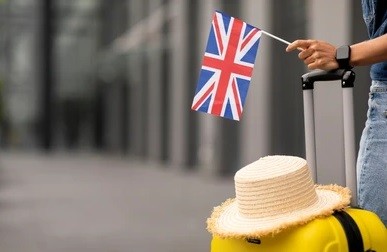Important Things to do After Arriving in the UK to Study

Going to study in the United Kingdom is very fascinating yet challenging at the same time. It is also important that your arrival signals the start of a convenient stay; therefore some key activities must be accomplished as soon as one arrives. So here in this blog, we shall discuss some of the most essential actions everyone should take after arriving in the UK to get established quickly.
Here are some things you should do after arriving in the UK to study:
-
Complete Your University Registration
The first thing that needs to be done is completing your university registration. Typically, this process requires submitting necessary documents, such as a passport, visa, academic records, etc., that verify that you are indeed enrolled in the university. Every college has its own specific instructions and deadlines, so make sure you check them out lest you miss any opportunity due to late registration. If you have any doubts about university registration, contact the study abroad consultants; they will assist you with the registration process. Finishing up with registration secures your place at the university. It allows you to access university resources and, if applicable, move into university housing. Not only this, but it also grants access to libraries and student ID cards, among other key services.
-
Sort Out Accommodation
If you have not organised your accommodation then it should be the next in the list that you should work on. While most universities have hostels and other forms of accommodations, private accommodation is also an option which is quite useful, especially for off-campus residents. Many websites may be handy when searching for private rented accommodations that suit individuals' needs best. While university halls might seem convenient, they tend to be costlier compared to other options available. However, ensure you stay in a safe neighbourhood. Shared houses could also work well due to the benefits associated with getting to know new people and reducing costs.
-
Open a Bank Account
You need to establish a bank account as soon as you get to the UK for monetary transactions as well as for receiving money from home and for daily expenses. Some banks have special accounts for students with features like interest-free overdrafts, so grab this chance if possible. You will need a passport, proof of address like a utility bill or tenancy agreement that shows where you are staying in the UK, plus a student enrollment letter issued by the university, among other requirements, during the account opening process.
-
Register with a GP
Sorting out healthcare becomes paramount. So register with a local General Practitioner (GP) who will link your access to the National Health Service (NHS). This comes in handy when a need arises for medical attention. Locate a GP using the NHS website; complete registration forms available either online or at the doctor's office, then produce proof of residence usually required when registering as a patient under NHS care.
-
Attend Orientation Programs
International student orientation programs are commonly organised by colleges and universities. These sessions provide campus facility information, academic expectations and life in the UK. You learn tips and hints that can greatly assist you in settling down quickly in a new environment away from home. Besides socialising with fellow students, attending these events helps you discover what resources are available, which may make you feel less homesick and overwhelmed.
-
Set Up a Mobile Phone Plan
You definitely need to stay connected; therefore, setting up a mobile phone plan should be given higher priority. If unsure about data requirements, go for pay-as-you-go plans, while those who prefer stability may opt for contracts instead.
-
Know Local Transport System
Getting familiar with how transportation works locally could save a lot of time and energy. Busses, trains, and the London Underground make up an extensive public transport system in the UK. Getting an Oyster Card is highly recommended for anyone travelling frequently in London. You can avail of student discount passes as well.
-
Investigate the Surrounding Area
The important thing is to gain local knowledge. New residents should check out nearby shops, parks and landmarks. Residents are advised to visit local markets for fresh produce and unique finds. Most UK cities have a lot of history, so there are numerous historic sites to explore. Parks and recreational areas are good for relaxing.
-
Manage Your Money
For the effective management of your resources, stick to budget. Make a budget which includes everything you spend on such as rent, food, transport and entertainment. There are some people who might want to try out budgeting apps that can help with tracking their spending. It would also be recommended to always search for student discounts since there are a lot of places that give them once presented with a valid ID card. Remember it is good to save money for unforeseen costs or emergencies.
-
Keep in Touch with Family and Friends
Keeping in touch with family and friends back home is crucial for maintaining your support network and easing homesickness. Use video calls, social media, and messaging apps to stay connected. WhatsApp is popular for international messaging and calls. Skype and Zoom are great for video calls, and social media helps you keep updated on what's happening back home.
-
Join Student Societies and Clubs
Joining clubs/societies at university can be great fun because not only will it expose you to different people but also help pursue hobbies/interests outside academic work (which counts towards enhancing CVs). Most universities offer a wide range of societies, from sports and arts to academic and cultural groups. Joining societies helps you build connections, gain skills and experiences that look great on your resume, and continue or discover new passions.
-
Learn About British Culture And Etiquette
It can be hard adapting yourself into another country's culture, but if one knows about proper customs and etiquette, then things will start making sense quickly. For example, understanding how queuing works, i.e. lining up in an orderly fashion or being polite when addressing strangers, etc. Also, respecting one's privacy is highly appreciated since personal space means a lot here. Timekeeping too matters most; hence, never be late for any appointment because this may be regarded as rude. Learning British slang can help in understanding local conversations better.
-
Plan Your Studies
It's essential that you manage your academic work well for success. A good number of students usually fail their exams due to poor time management skills, failure to understand course requirements and lack of seeking help when needed. Therefore, come up with a proper study plan which should be followed strictly; know library hours/locations whether there are group studies taking place or even make friends who can act as study partners. Then finally, remember to balance between school work and leisure.
-
Look for Part-Time Job Opportunities
This option only applies if a visa permits working part-time during studies. Finding yourself a job while still studying has its advantages. They include gaining valuable experience as well as boosting financial stability, especially if the income generated can cover living costs to some extent. Most universities have job boards where jobs are advertised. Understand your visa restrictions to check how many hours you can work. On-campus jobs are often more flexible with student schedules, and gaining work experience is valuable for your CV and future job prospects.
Also Read: Which are the Leading Universities in the UK for Indian Students?
Conclusion
One has to plan well and act fast after arriving in the UK for studies. These steps are necessary for a successful and fun time in the UK. From enrolling into university to knowing the local areas around, each task should be done as it will help one settle down easily while making the most out of their stay abroad.
Related Blog
 (1)664aed680a8e9.png)
10 Easy Steps to Get a Study Abroad Scholarship
 (1)66437fcf8db2c.png)
Self-Application or Study Abroad Consultant: Which is Better?
6643606f06693.png)
What are the potential challenges of studying abroad, and how to overcome them?
6628d683c5c4c.png)
Budgeting Tips for Studying in Australia

How do I apply for a Master's at Canadian universities?

How to Prepare for a Canada Student Visa Interview?

How to Improve Your Communication Skills For Abroad Studies

A Comprehensive Guide To Applying For A PG Work Permit In Canada
65a670c6772ef.jpg)
UK Student Visa: New Rules from 2024 Applications

Top Colleges In Canada For MBA Without GMAT

Part-Time Jobs in Canada

Preparing Invitation Letter For Canada Visa: All You Need To Know

Cost Of Studying For Indian Students In The UK

Visa requirements for Indian students to study abroad in the UK

GRE Accepting Universities In The USA

Public Vs Private Universities - Which Is Better?

How To Apply Student Visa For The USA?
6505864a3be98.jpg)
Best Interior Design Programs In The UK
64fee13f97d75.jpg)
Difference Between SDS and Non-SDS Visa Applications
64f5f29debd74.jpeg)
Reasons Why You Should Study Hospitality Management In The UK?
64f09d22881c9.jpg)
What Are The Short-Term Study Abroad Programs For Indian Students?

How do I write an effective SOP for UK Universities to get visa assistance?
64e32f0ff2ec4.jpg)
Cost Of Studying In Canada For Indian Students
64df3a0b57710.jpg)
How to Find Student Accommodation in France?
64da4a92186d6.png)
What are the Reasons Students Choose Nursing as a Career Abroad?
64d5f2456ddca.jpg)
How to Find Paid Internships in Canada for Indian Students in 2023?

Things were a Culture Shock For an Indian Students in the UK
64cce0d0e81c5.jpg)
Tips For Overcoming Language Barriers For Indian Students Studying Abroad

How Can Internship Abroad Expand Your Career Horizon?

How to Find Student Accommodation for Indian Students in a Foreign Country

Which are the Main Scholarships by Australian Universities for Indian Students?

How to Prepare for Duolingo English Test?

What are the Preparations You Take Before Your IELTS Test?

How to Get a Graduate Assistantship in the USA to Students?

What are the Safety Tips for Indian Students Studying Abroad?

What are the Tips for Winning an MBA Scholarship in the UK?

How to Get Eight Bands in IELTS Speaking?

Which are the Leading Universities in the UK for Indian Students?

How do Indian Students Get into Law Universities in Canada?

What are the Trending Courses to Study at Universities in Canada?

What are the Different Health Science Courses Available in Canadian Universities?

Studying in the UK vs the US: Which is Better For Students?

Tips for Indian Students to Adjust to a New Culture while Studying Abroad

Jobs and Internship Opportunities for Indian Students while Studying Abroad

How to Choose the Right Course for Study Abroad

Popular Destinations for Indian Students to Studying Abroad

Scholarships and Financial Aid for Indian Students to Studying Abroad

How to Prepare for Standardised Tests like TOEFL and GRE for Studying Abroad

Why is Studying Abroad Good for Your Career?

Things to Consider When Choosing an Overseas Educational Program

How to Manage the Funds for your Study Overseas?

Studying Abroad on a Budget: Tips for Making it Affordable
642d3ed3db028.jpeg)
Scholarships and Funding Opportunities for Indian Students to Study Abroad

Tips for Preparing to Study Abroad: From Application to Departure

Benefits of pursuing an MBA from Canada

Things to Consider Before Choosing a Study Abroad Destination

How much does it cost to study abroad?

How to get a student visa for studying abroad?

How to choose your university to study abroad

Why do Indians prefer to study abroad?

How to get an education loan in India to study abroad?

What are the factors influencing students to study abroad

Top 10 Study Abroad Consultants in Kerala

Most reputed study abroad consultants for UK education

